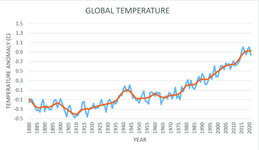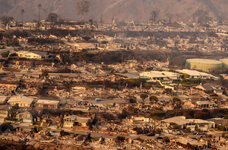Extreme fire behavior doesn’t stop at borders - didn’t Washington burn almost a million acres a decade ago? A few dry years to reduce moisture in thicker fuel sources is all it takes for entire forests to burn. Towns who have traditionally had low fire activity are lazy about fire protection - unusually low humidity will pass fire from house to house from embers that normally would go out.
In my lifetime I’ve seen a noticeable change in the occurrence of extreme fire behavior - and that’s after only 1/3 degree increase in temps every decade. Skiable snow days are less, snow banks don’t last as long, fire seasons are not the same.
The extremes in worldwide weather ups and downs will continue to get worse - it’s not a matter of IF more towns on the west coast will get wiped out, but when. You don’t even need to believe humans are responsible - even if it’s all just a normal natural cycle, the trend is easy to see.
The insurance that’s been cancelled prior to the latest fires will be huge to both the companies that pulled out, as well as the higher priced insurance that filled the void.
View attachment 823924


